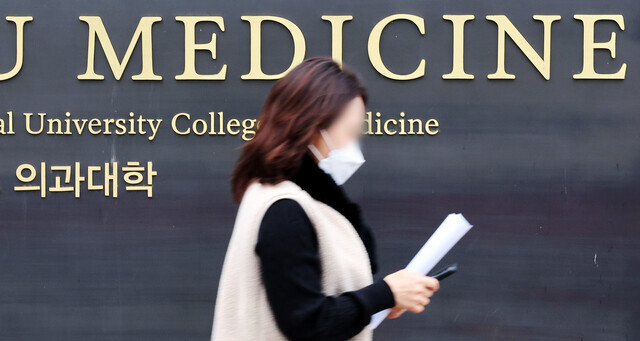hankyoreh
Links to other country sites 다른 나라 사이트 링크
Korea to hike med school admissions with hope of adding 10,000 doctors by 2035

South Korea plans to add 10,000 physicians to its workforce by increasing the nationwide medical school admission cap by 2,000 as of this year’s entrance examination. This upper limit will be kept in place for five years.
This is to be the first increase in the medical college admission cap in 27 years, the last coming in 1998, when Jeju National University established its medical school.
After the Korean Medical Association (KMA) announced plans for a general strike to protest the measure, the government raised its health care disaster alert by two steps to the “caution” level and issued orders to the association’s leaders to refrain from engaging in or encouraging collective action.
The decision was announced during a Cabinet meeting on Tuesday, where President Yoon Suk-yeol said, “Increasing the number of physicians in order to preserve the public’s health and lives is a historic task that can no longer be delayed.”
After a health care policy review committee meeting later that day, Minister of Public Health and Welfare Cho Kyoo-hong held an afternoon briefing in which he announced that the collective admission cap for South Korea’s 40 medical colleges would be increased by 2,000 from its current 3,058 to 5,058 starting in the 2025 academic year, when current third-year high school students will be entering university.
“If 2,000 additional students are admitted [annually] starting in 2025, as many as 10,000 additional physicians will be gained over the five-year period starting in 2035 as they begin graduating in 2031,” Cho explained.
The Ministry of Health and Welfare had originally been considering plans to increase the total cap by 512. Its decision to raise that number substantially all the way to 2,000 was based on estimates that an additional 10,000 physicians would be needed by 2035 to meet health care demands.
The ministry explained that since it takes six years for a student to complete their medical education — including two years of pre-med coursework and a four-year main curriculum — total admissions for the years from 2025 to 2029 would have to be drastically increased by 10,000 to ensure that as many physicians would be available to work six years later between 2031 and 2035.
The administration plans to allocate the increased spots primarily to existing medical colleges outside the greater Seoul area. But it did not share any information Tuesday on how the actual caps of individual colleges would be affected as of the 2025 academic year.
The Ministry of Education appears likely to announce the quotas for each school sometime in April after conducting an allocation based on procedures to verify demand for increased numbers at specific universities.
The administration also presented plans to increase the rate of “special selections of local talent” by over 60% of new admissions — a system encouraging medical colleges outside the greater Seoul to select students from their particular region.
Ahead of the government’s announcement Tuesday, the KMA held an emergency press conference to express its vehement objections and announce plans for a general strike if the cap is raised.
In response, the Health and Welfare Ministry announced that evening that it had established a dedicated headquarters for collective action by physicians and ordered a ban on collective action and the encouragement thereof by the KMA leadership in accordance with the Medical Service Act.
The ministry plans to take necessary measures such as administrative disciplinary action and the lodging of legal complaints if the KMA or other physician groups defy the ban and engage in illegal acts that potentially endanger the health of members of the public.
By Lim Jae-hee, staff reporter; Kim Mi-na, staff reporter
Please direct questions or comments to [english@hani.co.kr]

Editorial・opinion
![[Column] Welcome to the president’s pity party [Column] Welcome to the president’s pity party](https://flexible.img.hani.co.kr/flexible/normal/500/300/imgdb/original/2024/0515/3917157400447943.jpg) [Column] Welcome to the president’s pity party
[Column] Welcome to the president’s pity party![[Editorial] Korea must respond firmly to Japan’s attempt to usurp Line [Editorial] Korea must respond firmly to Japan’s attempt to usurp Line](https://flexible.img.hani.co.kr/flexible/normal/500/300/imgdb/original/2024/0514/2317156736305813.jpg) [Editorial] Korea must respond firmly to Japan’s attempt to usurp Line
[Editorial] Korea must respond firmly to Japan’s attempt to usurp Line- [Editorial] Transfers of prosecutors investigating Korea’s first lady send chilling message
- [Column] Will Seoul’s ties with Moscow really recover on their own?
- [Column] Samsung’s ‘lost decade’ and Lee Jae-yong’s mismatched chopsticks
- [Correspondent’s column] The real reason the US is worried about Chinese ‘overcapacity’
- [Editorial] Yoon’s gesture at communication only highlights his reluctance to change
- [Editorial] Perilous stakes of Trump’s rhetoric around US troop pullout from Korea
- [Guest essay] Preventing Korean Peninsula from becoming front line of new cold war
- [Column] The state is back — but is it in business?
Most viewed articles
- 1[Column] Welcome to the president’s pity party
- 2[Editorial] Korea must respond firmly to Japan’s attempt to usurp Line
- 3Korea cedes No. 1 spot in overall shipbuilding competitiveness to China
- 4Could Korea’s Naver lose control of Line to Japan?
- 5[Editorial] Transfers of prosecutors investigating Korea’s first lady send chilling message
- 6[Column] Will Seoul’s ties with Moscow really recover on their own?
- 7US has always pulled troops from Korea unilaterally — is Yoon prepared for it to happen again?
- 8Second suspect nabbed for gruesome murder of Korean in Thailand, 1 remains at large
- 9Korean auto industry on edge after US hints at ban on Chinese tech in connected cars
- 10Major personnel shuffle reassigns prosecutors leading investigations into Korea’s first lady